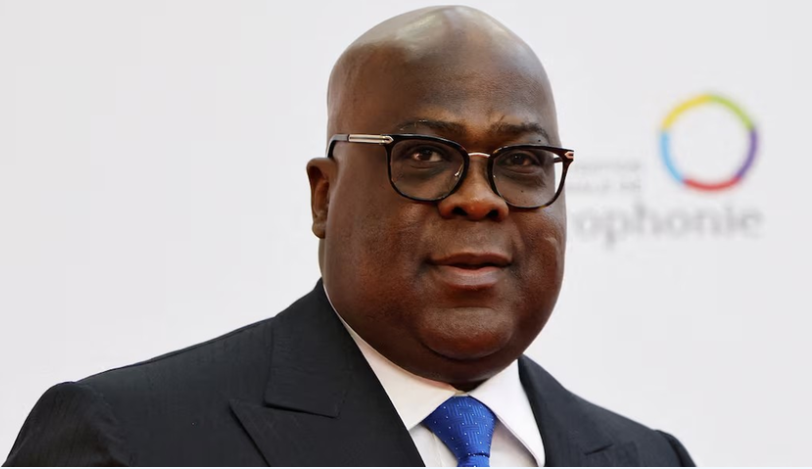
The Democratic Republic of Congo (DRC) finds itself at a critical juncture as President Félix Tshisekedi seeks to navigate escalating challenges posed by the M23 rebel offensive. In an effort to address the growing unrest and foster national unity, Tshisekedi has turned to the formation of a “broad-based” government. This approach aims to bring together a diverse coalition of political actors, civic leaders, and regional stakeholders to tackle the ongoing conflict and restore stability to the eastern regions of the country.
The M23 rebel group, which has reignited its campaign in the eastern provinces of the DRC, has led to widespread displacement of civilians, human rights abuses, and the destabilization of local communities. The group’s resurgence has exposed weaknesses in the Congolese military’s ability to maintain security, leading to mounting pressure on the Tshisekedi administration to implement swift and effective solutions. With this backdrop, the creation of a more inclusive government is seen as a strategic move to consolidate domestic support and leverage regional cooperation to address the multifaceted crisis.
At the heart of Tshisekedi’s strategy lies the recognition that a fragmented political landscape hinders the country’s ability to respond effectively to the M23 threat. By incorporating opposition figures and representatives from marginalized communities into his administration, Tshisekedi seeks to build a united front capable of addressing the root causes of the conflict. This approach, while ambitious, carries risks, as balancing competing interests within a broad-based government may prove challenging in a country already grappling with political instability.
The M23 offensive has further strained the DRC’s relations with neighboring Rwanda, which Kinshasa accuses of backing the rebel group. Kigali has denied these allegations, but tensions between the two nations remain high. Tshisekedi has called on the international community to increase diplomatic pressure on Rwanda, urging sanctions and accountability for any external actors found to be supporting the rebels. At the same time, the DRC has sought to strengthen its alliances with regional powers, including Uganda and Angola, to bolster its security apparatus and counter the M23 insurgency.
Efforts to address the humanitarian crisis caused by the conflict have also taken center stage. With thousands of civilians displaced and basic services disrupted, Tshisekedi’s government faces immense pressure to provide relief and restore order in affected areas. International humanitarian organizations have called for increased funding and coordination to address the immediate needs of vulnerable populations. The DRC’s ability to manage the humanitarian fallout will be a key test of its government’s capacity to navigate the crisis.
Critics of Tshisekedi’s approach argue that forming a broad-based government may not be sufficient to address the underlying issues driving the conflict. They emphasize the need for comprehensive reforms to strengthen governance, combat corruption, and enhance the capabilities of the Congolese military. Without these systemic changes, they argue, any gains made through political inclusion could be short-lived.
Despite these challenges, Tshisekedi remains committed to pursuing dialogue and collaboration as cornerstones of his strategy. By engaging with regional organizations such as the African Union and the East African Community, the DRC hopes to secure international support for a sustainable resolution to the conflict. Initiatives such as the Nairobi Process, which aims to foster dialogue between the DRC and neighboring states, underscore the importance of regional cooperation in addressing the M23 crisis.
The DRC’s mineral-rich eastern provinces, which are at the heart of the conflict, add another layer of complexity to the situation. The region’s wealth in resources such as gold, coltan, and tin has long been a source of contention, with armed groups vying for control and profiting from illicit trade. Tshisekedi’s government has pledged to crack down on illegal mining activities and ensure that the benefits of the country’s natural resources are shared equitably among its citizens. Achieving this goal will require robust enforcement mechanisms and international collaboration to disrupt the networks that finance armed groups.
In the face of these challenges, Tshisekedi’s broad-based government initiative reflects a broader vision for a more inclusive and resilient Congo. By addressing the political, economic, and security dimensions of the crisis in tandem, the administration aims to lay the groundwork for lasting peace and stability. However, the success of this approach will depend on its ability to navigate the complex web of domestic and international factors shaping the conflict.
As the M23 offensive continues, the DRC stands at a crossroads. The choices made in the coming months will have far-reaching implications for the country’s future and the broader region. By fostering unity and pursuing comprehensive solutions, Tshisekedi’s administration has the potential to chart a path toward peace and development. Yet, the road ahead remains fraught with obstacles, and the ultimate outcome will depend on the collective will and determination of all stakeholders involved.

